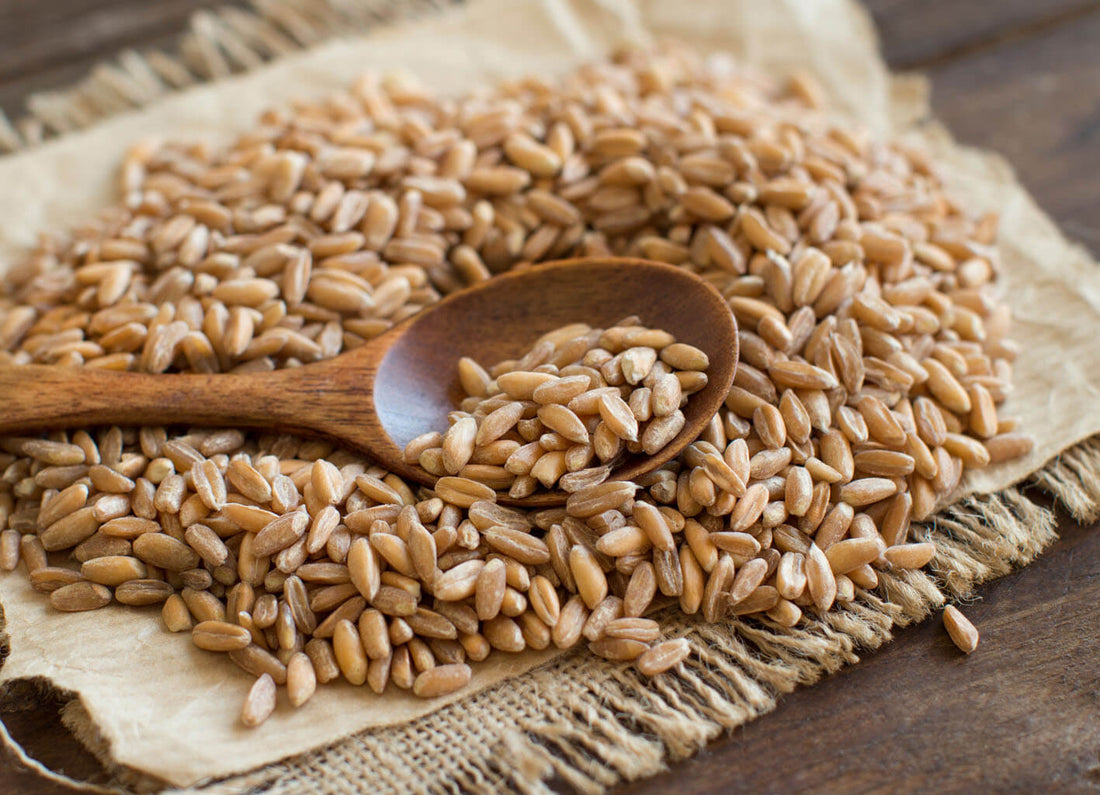What is Spelt?
Spelt, or “dinkel” is from the wheat family, but spelt differs from wheat in that it has only 28 chromosomes compared to wheat’s 42. This means that although it has as much gluten as wheat, spelt has a different type of gluten which is more fragile and water-soluble. Therefore spelt is much softer and gentler on the digestive system than wheat. The high-water solubility of spelt enables the nutrients to be absorbed more easily by the body. Because spelt is more easily digested than wheat, it doesn’t cause the bloating or skin rashes from which many people who are sensitive to wheat suffer. As a result, those who are gluten-sensitive are better able to tolerate spelt, substituting spelt for wheat in breads, and general baking. Whole grain spelt flour is very fine, making beautiful loaves of bread that are somewhat lighter than those made with whole grain wheat flour.
Spelt is an ancient grain that was popular in the Middle Ages, especially in Europe, and had spread to Britain by 500BC. Its popularity grew because, unlike wheat and other grains, it is husked and therefore adapts better to cold climates and survives storage better. Its husks, or hulls, enable it to tolerate damp, heavy soil. By the 1890s, spelt was introduced to America, but was largely replaced by Durum wheat in the 1900s. However, during the organic farming revival in the late 20th century, spelt recovered popularity because it requires less fertilizer and sprays than wheat. Spelt doesn’t need insecticides and other sprays in order to grow well, as its sturdy husks, or hulls, protect the grain from pollutants and insects. Therefore, spelt has not been genetically modified in any way.
What's in Spelt?
Spelt has now become a common substitute for wheat because of its unique
properties (as mentioned above), and because of its superior nutritional profile, being 10 to 25% higher in protein than wheat, and richer in the B vitamins and in fibre than wheat. As well as many vitamins, spelt contains a broad spectrum of minerals, including manganese, calcium, iron and phosphorous, and also specialized carbohydrates (called Mucoploysaccharides) that are essential for blood clotting and stimulating the immune system of the body.
How does Spelt help us?
Spelt husks or hulls protect the grain, enabling it to retain its nutrients, and stay fresh longer, being de-hulled before milling. The health benefits of spelt include support for the body’s immune system, improved digestion with the fibre helping regularity of bowels, increased bone density, improved oxygenation and flow of the blood system, regulating blood sugar levels, reducing high blood pressure and heart disease, improving cardiovascular health, lowering LDL cholesterol, balancing of fatty acids, and improving brain function.
Spelt is, therefore, such a valuable grain, that a local farmer agreed to grow it
organically for us, and so we can offer it locally grown and freshly harvested in the Manawatu, NZ, and milled by us on site in Palmerston North at Organic Flour Mills in our Zentrofan mills. What could be better?!
Why Choose Spelt Flour?
So, what is spelt flour? Spelt, also known by its German name "dinkel", is from the wheat family, as its botanical name Triticum spelta, suggests. It is an ancient grain that was popular in the Middle Ages, especially in Europe, and had spread to Britain by 500 BC. Its popularity grew because its husks enable it to adapt to cold climates, and survive storage better than wheat and other grains. In addition, its husks, or hulls, enable it to tolerate damp, heavy soil.
By the 1890s, spelt was introduced to America, but was replaced mainly by Durum wheat in the 1900s. However, during the organic farming revival in the late 20th century, spelt regained popularity because it requires less fertilizer and sprays than wheat. Spelt doesn't need insecticides to grow well, as its sturdy husks protect the grain from pollutants and insects.
Therefore, spelt has not been genetically modified in any way. In addition, you may be wondering, "Is spelt flour gluten-free?" Although it is not gluten-free, the good news is that its gluten is easily digested.
How does Spelt differ from Wheat?
Spelt grain differs from wheat because it has only 28 chromosomes compared to wheat's 42. This difference means that although it has as much gluten as wheat, spelt has a different type of gluten – more fragile and water-soluble. Therefore, spelt is much softer and gentler on the digestive system than wheat.
In addition, spelt's high water solubility enables nutrients to be absorbed more easily by the body. Because it digests more easily than wheat, spelt doesn't cause bloating or skin rashes from which many people who are sensitive to wheat suffer.
As a result, gluten-sensitive people can better tolerate spelt, substituting it for wheat in bread and general baking. Whole-grain spelt flour is also very fine, making beautiful loaves of bread somewhat lighter than those made with whole-grain wheat flour. So, is spelt flour gluten-free and healthy? No, it is not technically gluten-free, but yes, spelt grain is a healthier alternative to wheat.
Spelt is More Nutritious Than Wheat
This ancient grain has become a common wheat substitute because of its unique properties and superior nutritional profile. It is 10 to 25% higher in protein than wheat, and richer in B vitamins and fibre. As well as many vitamins, spelt contains a broad spectrum of minerals. These nutrients include manganese, calcium, iron and phosphorous, and specialized carbohydrates (Mucopolysaccharides) essential for blood clotting and stimulating the immune system.
Additional health benefits of spelt may include improved digestion, thanks to the fibre content. Also increased bone density, improved oxygenation and circulation, and better-regulated blood sugar levels. It may help reduce high blood pressure, improve cardiovascular health, lower LDL cholesterol, balance fatty acids, and improve brain function.
Spelt is not de-hulled until harvesting, which protects the grain, enabling it to retain its nutrients and stay fresh longer. Therefore spelt is a valuable grain with superior benefits, as long as it is sourced from organically-grown and reputable producers.
Choose Locally-Grown Spelt From Organic Flour Mills
We are so confident in the potential power of spelt that a local Bio-Gro certified farmer agreed to grow it organically for us. So now we can offer spelt locally grown and freshly harvested in Manawatu, NZ, and milled on-site in Palmerston North in our Zentrofan mills. What could be better? Place your order today or contact us for more information.

